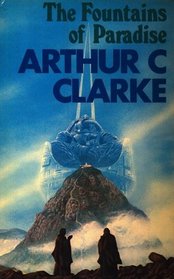This is a neat outline of the creation of the 'Space Elevator' a tower physically linking the planet to space, which will make inner solar system spaceships pretty much obsolete. Does anyone need to say that the spaceship industry is totally opposed to the idea? Also opposed are the monks whose order has lived on the proposed building site for millenia, and some of the monks are sure that God will OK any opposition to the Tower's construction, no matter who else or what else gets hurt. Clarke also skips back into history to show what happened to others who wanted to build on the site.
From back cover:
Sri Kanda, the Sacred Mountain was the holiest place in the ancient land of Taprobane. It was also the only possible site for the most daring feat of engineering in Man's history.
Vannemar Morgan's visionary dream would link Earth to the stars--if a million technical problems could be solved---if rival nations could be persuaded to cooperate--if the money could be found, and if the ages-old order of monks atop Sri Kanda would allow their sanctuary to be profaned forever...
2,000 years earlier, the mad King Kalidasa had fought the monks of Sri Kanda to create his own vision of glory---and paid with his life. Now Vannemar Morgan may perhaps share the same fate.
From back cover:
Sri Kanda, the Sacred Mountain was the holiest place in the ancient land of Taprobane. It was also the only possible site for the most daring feat of engineering in Man's history.
Vannemar Morgan's visionary dream would link Earth to the stars--if a million technical problems could be solved---if rival nations could be persuaded to cooperate--if the money could be found, and if the ages-old order of monks atop Sri Kanda would allow their sanctuary to be profaned forever...
2,000 years earlier, the mad King Kalidasa had fought the monks of Sri Kanda to create his own vision of glory---and paid with his life. Now Vannemar Morgan may perhaps share the same fate.
As always, Clarke is one of the best! A great story!
From Amazon:
Clarke goes for broke, first putting forward an idea that was totally new at the time: a space elevator. For those of you not scientifically inclined, it's basically a long tether connecting a station orbiting the planet, and people could run up and down the cable in cars. Basically it would make spaceflight easier because ships could launch and refuel up there and not have to worry about gravity and escape velocity and it just opens the entire solar system up. These days it's been more commonplace, writers don't even bother centering entire books around it (though Kim Stanley Robinson probably had this book in mind when he had the Martians install an elevator in his Red/Green/Blue Mars book), but back then it was a fairly new idea. And a great one, it's out there but enough so the reader can envision it, the problem with the Ringworld is that I have trouble picturing it within the realms of reality, I just can't, I know it's possible but I just can't do it. Here, it's gloriously real and Clarke takes you every step of the way. He sets the novel in a renamed Sri Lanka and then proceeds to play with the history, framing the story about a king who built a series of gardens to reach the gods two thousand years before. Also there's this alien spacecraft that happens to pass through years before and laughs at the thought of God, which I thought had little relevance (I thought Clarke was just making sly references to Rendevous with Rama at first) and that makes perfect sense as well. It's a quick read, but not a light one, the science concepts are presented so that those without engineer's degrees can follow. But if you ever thought that we're reached the limits of our technical achievements, go read this and see just how far we can go.
Clarke goes for broke, first putting forward an idea that was totally new at the time: a space elevator. For those of you not scientifically inclined, it's basically a long tether connecting a station orbiting the planet, and people could run up and down the cable in cars. Basically it would make spaceflight easier because ships could launch and refuel up there and not have to worry about gravity and escape velocity and it just opens the entire solar system up. These days it's been more commonplace, writers don't even bother centering entire books around it (though Kim Stanley Robinson probably had this book in mind when he had the Martians install an elevator in his Red/Green/Blue Mars book), but back then it was a fairly new idea. And a great one, it's out there but enough so the reader can envision it, the problem with the Ringworld is that I have trouble picturing it within the realms of reality, I just can't, I know it's possible but I just can't do it. Here, it's gloriously real and Clarke takes you every step of the way. He sets the novel in a renamed Sri Lanka and then proceeds to play with the history, framing the story about a king who built a series of gardens to reach the gods two thousand years before. Also there's this alien spacecraft that happens to pass through years before and laughs at the thought of God, which I thought had little relevance (I thought Clarke was just making sly references to Rendevous with Rama at first) and that makes perfect sense as well. It's a quick read, but not a light one, the science concepts are presented so that those without engineer's degrees can follow. But if you ever thought that we're reached the limits of our technical achievements, go read this and see just how far we can go.




